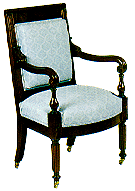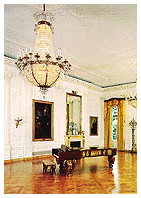

The East Room, scene of many historic White House events, was designated by Hoban as the "Public Audience Room." It normally contains little furniture and traditionally is used for large gatherings, such as dances, after-dinner entertainments, concerts, weddings, funerals, award presentations, press conferences, and bill-signing ceremonies.
Today the East Room retains the late 18th-century classical style to which it was restored by architects McKim, Mead & White during the Roosevelt renovation of 1902. An oak floor of Fontainebleau parquetry was installed at the time as were the bronze electric-light standards, upholstered benches, and the three Bohemian cut-glass chandeliers. The walls were paneled in wood with classical fluted pilasters and relief insets. The paneling was painted white, and delicate plaster decoration was added to the ceiling.
The Steinway grand piano with gilt American eagle supports was designed by Eric Gugler and was given to the White House in 1938 by the manufacturer. It is decorated with gilt stenciling by Dunbar Beck.
The full-length portrait of George Washington that hangs here is one of several replicas made by Gilbert Stuart of his "Landsdowne" portrait. It is the only object known to have remained in the White House since 1800--except for periods of reconstruction, such as after the British burned the mansion during the War of 1812.

Local artistry, 1818: President Monroe purchased 24 chairs for the East Room from William King, cabinetmaker of Georgetown. One of these chairs is pictured here.
During the Civil War years and administration of Abraham Lincoln there was much activity in the East Room. At one time during the war Union troops occupied the room.
In 1864, the East Room was the scene of a large reception given by President Lincoln in honor of Ulysses S. Grant shortly before his appointment as head of all the Union armies. When Grant became President, he had the East Room redecorated. In April of 1865 the East Room was again filled with people, but this time they were mourners surrounding the body of President Lincoln after he had been assassinated by John Wilkes Booth. Seven Presidents have lain in state in the East Room, including John F. Kennedy in November 1963.
When President Arthur redecorated the White House in 1882, Louis C. Tiffany found it necessary only to install silver paper on the ceiling of the East Room and to increase the number of potted plants. All of these heavy Victorian adornments were swept away in the 1902 restoration. During the Theodore Roosevelt Administration, this room became the scene of some unusual activities, including a wrestling match arranged to entertain some 50 to 60 guests of the President. The exuberant Roosevelt children are also known to have used the East Room for roller-skating.
 |
 |
 |
President and First Lady | Vice President and Mrs. Gore
Record of Progress | The Briefing Room
Gateway to Government | Contacting the White House | White House for Kids
White House History | White House Tours | Help
Privacy Statement